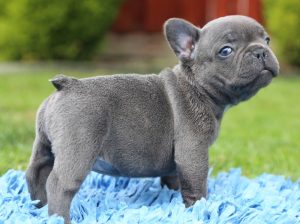Basic information about French Bulldogs
French Bulldogs, also known as Frenchies, are small-sized, muscular, and compact dogs with distinctive bat-like ears and a charming, expressive face. Here’s an overview of French Bulldogs:
Appearance
French Bulldogs have a sturdy and muscular build, with a smooth coat that comes in a variety of colors, including brindle, fawn, white, cream, and pied (a combination of white with any of the aforementioned colors).
They have a distinctive square-shaped head with a wrinkled forehead, prominent cheeks, and a short, broad muzzle. Their large, rounded eyes are set wide apart, giving them an endearing and expressive look.
One of the most recognizable features of French Bulldogs is their distinctive “bat ears,” which are broad at the base, erect, and slightly rounded at the tips.
Temperament
French Bulldogs are known for their affectionate, sociable, and adaptable temperament. They are affectionate and loyal companions, forming strong bonds with their families and often seeking out human companionship.
Despite their small size, French Bulldogs have a sturdy and confident demeanor. They are playful, outgoing, and enjoy interacting with people of all ages, including children.
French Bulldogs are also known for their comedic antics and sense of humor, often delighting their owners with their quirky behavior and expressive facial expressions.
History
French Bulldogs have a rich history dating back to the 19th century, where they were developed in England as miniature versions of the English Bulldog.
They were popular among lace workers in the Nottingham region, who brought them to France during the Industrial Revolution.
In France, French Bulldogs gained popularity among the Parisian elite, particularly artists, writers, and members of high society. They became fashionable companions and were frequently depicted in artwork and literature.
French Bulldogs were recognized by the American Kennel Club (AKC) in the late 19th century and have since become one of the most popular and beloved breeds in the United States and around the world.

Care
French Bulldogs have relatively low exercise needs and are well-suited to apartment living or homes with limited space. However, they still require daily walks and mental stimulation to stay healthy and happy.
Due to their short coat, French Bulldogs are relatively low-maintenance in terms of grooming. Regular brushing and occasional baths are usually sufficient to keep their coat clean and healthy.
French Bulldogs are brachycephalic, meaning they have a short skull shape that can lead to respiratory issues in extreme heat or during strenuous exercise.
Owners should take precautions to prevent overheating and avoid excessive exertion in hot weather.
Health
French Bulldogs are prone to certain health issues, including brachycephalic syndrome (breathing difficulties), hip dysplasia, spinal disorders, skin allergies, and certain hereditary conditions.
Responsible breeding practices and regular veterinary check-ups are essential for maintaining the health and well-being of French Bulldogs. Potential owners should research breeders carefully and be aware of the breed’s health concerns.
Overall, French Bulldogs are cherished for their affectionate nature, charming personality, and unique appearance. They make delightful companions for individuals and families seeking a loyal and loving canine companion.
Diets
- High-Quality Dog Food: Choose a high-quality commercial dog food that is specifically formulated for small breeds or for all life stages. Look for a dog food that lists meat or meat meal (such as chicken, beef, or fish) as the first ingredient and contains balanced nutrients, including protein, carbohydrates, fats, vitamins, and minerals.
- Protein: Protein is important for muscle development and overall health. Look for dog foods that contain high-quality sources of protein, such as chicken, turkey, beef, fish, or lamb. Avoid dog foods with excessive fillers or low-quality protein sources.
- Carbohydrates: Carbohydrates provide energy for daily activities. Opt for dog foods that contain wholesome carbohydrates such as brown rice, sweet potatoes, peas, or barley. Avoid dog foods with excessive amounts of corn, wheat, or soy, which may be difficult for some dogs to digest.
- Healthy Fats: Healthy fats are essential for maintaining healthy skin and coat, as well as providing energy. Look for dog foods that contain sources of omega-3 and omega-6 fatty acids, such as fish oil, flaxseed, or chicken fat.
- Portion Control: French Bulldogs are prone to obesity, so it’s important to monitor their portion sizes and avoid overfeeding. Follow the feeding guidelines provided on the dog food packaging, and adjust the portions based on your dog’s age, weight, activity level, and individual needs.
- Meal Frequency: French Bulldogs typically do well with two meals per day, divided into morning and evening feedings. Avoid free-feeding (leaving food out all day), as this can lead to overeating and weight gain.
- Hydration: Ensure that your French Bulldog has access to fresh, clean water at all times. Proper hydration is essential for digestion, temperature regulation, and overall health.
More posts you might be interested in:

